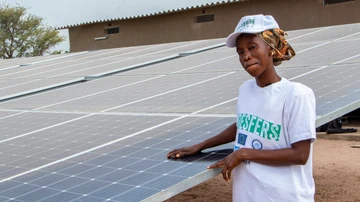Started in 2011 and increased in recent years by drought and famine, the crisis in the sahel Central Africa (Mali, Burkina Faso and Niger) has had a full impact on girls, faced with situations of extreme dangers that compromise your life and your future. This is clear from the Plan International report ‘Impossible Decisions, Ignored Voices’, which illustrates how the crisis further worsens pre-existing inequalities and the risks that threaten them. Desperate, the girls and their families make decisions that end up condemning them to family separation, the care of their brothers, dropping out of school, child marriage, sexual exploitation and child labor.
Conflicts have caused schools to close, exacerbating rates of child marriage. Girls are married off for dowry, to reduce the number of mouths to feed in the home, or as a means to protect girls from out-of-wedlock pregnancy and violence. According to the latest data available, Mali has one of the highest child marriage rates in the worldwith the 54% of girls forced to marry before the age of 18 and 16% before the age of 15.
In Mali and Burkina Faso, law enforcement and the judiciary have been ineffective, and the most rape cases go unreported or are treated informally. The additional stress of conflict, famine and drought exacerbate these factors and increase the overall risk of gender-based violence.
“Girls in the Sahel live in a situation of insecurity and serious risk of violence in their homes, schools and communities. In a context of different crises, Plan International works to guarantee their access to education and basic services, protect them from violence and offer them opportunities for the future through employment and entrepreneurship”, says Concha López, general director of Plan International Spain.
Girls in Gourma-Rharous, Mali, say that due to the armed conflict, they are afraid to leave their homes to buy and sell food, collect firewood or visit their parents in nearby towns. Similarly, in Mali and Burkina Faso, 45% and 34% of girls, respectively, said they work to earn money but the crisis has reduced its capacity to trade and win.
Vital household chores, such as collecting water and firewood often falls to girls and women, but due to the conflict, the destruction of water pumps and the drought, they now often have to walk much more. As a result, they are at increased risk of violence, including that perpetrated by armed groups.
We are left to our own devices and there is no one to help us”
“Rapes are on the rise because we are left to fend for ourselves and there is no one to help us; internally displaced girls like me are the most affected. We are being raped, beaten and injured,” says a girl from Burkina Faso. The crisis in the central Sahel It began in 2011, when violence swept the region and was exacerbated by intercommunal tensions, population displacement, rising global food prices and the climate crisis.
In 2021, Mali experienced the most severe lack of rain in the last five years. at the beginning of 2023some 2.78 million internally displaced persons were registered in the region. In 2021, 78% of refugees and asylum seekers in the region were women and children.
The study of International plan on the situation of girls in the central Sahel is published before Women Deliverthe biggest global call on gender equality and healthrights and well-being of girls and women, held in Kigali (Rwanda) between July 17 and 20.
Social and economic empowerment through renewable energy
Plan International works in the Sahel region, among others, with the DESFERS project that aims at the social and economic empowerment of women through renewable energy and sustainable development.
In the rural areas of Senegal, Mali and Niger, women are the engine of the family economy, yet their chances of advancing in life are constantly limited by a poor education and zero possibilities of accessing professional training and business opportunities.

Plan International promotes the distribution of photovoltaic products in the central Sahel region of Africa | International plan
This project offers a unique opportunity to directly transform their lives by promoting their autonomy and sustainable development of their families and communities, through the use and commercialization of photovoltaic products in three countries of the Sahel, one of the areas in the world with more hours of sunshine and less access to electricity.
Source: Lasexta
Ricardo is a renowned author and journalist, known for his exceptional writing on top-news stories. He currently works as a writer at the 247 News Agency, where he is known for his ability to deliver breaking news and insightful analysis on the most pressing issues of the day.












